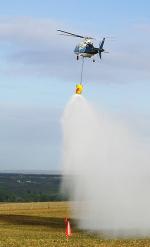Weed control effort is world first
A new approach to tackling a major weed problem in our own backyard may have worldwide benefits. South Australia's weed problem in the Murray Mallee has made headlines and garnered political support both locally and nationally. But the parasitic weed Orobanche ramosa (Branched broomrape) is hard to control. Broomrape tends to show up wherever host plants (such as some crops) are found, causing major problems for farmers and the economy. The discovery in South Australia's Mallee region in 1992 hurt many farmers and restricted internal trade and exports. As a result, some farms have been in quarantine for more than a decade. In 2001, the Grains Research & Development Corporation (GRDC) and the CRC Australian Weed Management funded a research effort to find new ways to tackle the weed and minimise harm to the environment. Three years later, Dr John Matthews from the University of Adelaide's School of Earth & Environmental Sciences, Roseworthy Campus, has developed new strategies and methods of control for this very troublesome weed. "The survival capacity of this weed lies in the seed reserve," Dr Matthews said. "It relies on seed numbers and seed longevity for persistence, and our new strategy is directly targeted at destroying the seed reserves." Existing methods of control include frequent herbicide use on emerging plants or the use of a toxic chemical, methyl bromide, to fumigate contaminated areas. The new method - which sees areas affected by Branched broomrape treated with an organic compound developed by Dr Matthews and his colleagues - will replace the latter and reduce the reliance on herbicides. Dr Matthews said developing an alternative to methyl bromide use was very heartening. "We were hopeful that we could replace methyl bromide with an environmentally safer product. Our treatment is registered as an organic product and does not require disturbing the landscape, so I am hopeful we have an acceptable solution," he said. Three years of hard work on that solution has yielded some positive results, with areas of the Murray region near Mannum recently treated with Dr Matthews's new compound. Research will continue to monitor the success of the treatment, but Dr Matthews remains confident. "The solutions to this problem are a world first, the soil treatment and methods of application are unique. We believe this will prove to be a significant step forward in the control of the weed," he said. The weed exists in other parts of the world, including areas of southern Europe, and in most cases it is increasing in range and intensity. If the South Australian trials of this new approach are ultimately successful, it will have global implications.
|





